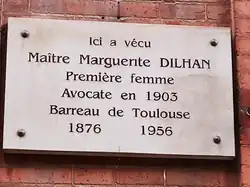Marguerite Dilhan
Marguerite Dilhan[1] (1876–1956), born on 17 September 1876 in Miélan in the Gers and died on 3 March 1956 in Toulouse, was a French lawyer. She was the first woman in France to open her own practice and plead in a criminal Cour d'assises on November 26, 1903.[2]
Biography
Born in 1876 in Miélan (Gers), Julie Marguerite was the daughter of Ferdinand and Antoinette Cécile Valérie Ponsan, who married on December 27, 1875, in Sembouès. She was 16 when her father passed away, and 18 when her mother followed, leaving three orphaned daughters, of whom Marguerite was the eldest. To meet their financial needs, she studied law at the University of Toulouse,[3] graduating in 1902.[4]
The French law of 1 December 1900 allowed women to take the oath of attorney, as did Olga Balachowski-Petit and Jeanne Chauvin.[5] During her internship, Marguerite Dilhan was Secretary of the Conference, a role reserved for top performing students. After obtaining her diploma in law at the University of Toulouse, she was sworn in July 1903, at the age of 27. She went on to become the first woman to open her own law firm and to plead before the Cour d'Assises in a criminal case on 26 November 1903, receiving the public compliments of the judge.[6] She continued her career as a lawyer for over fifty years. Agathe Dyvrande-Thévenin invited her to join the "Groupement amical des Avocates de France", at a time when women did not yet have the right to vote. Marguerite Dilhan was elected its vice-president. This organisation later became the l'Association française des femmes des carrières juridiques.
Marguerite Dilhan successfully defended Arria Ly,[7] a radical feminist who defended women's right to fair labor, the right to vote, and self-defense, engaged in duels against men. She also defended soldiers during the First World War before the war council. Later, in her office on rue Gatien-Arnoult, she was the lawyer for the very numerous Spanish refugees in Toulouse from 1939 onwards and for the Retirada.[8] In coordination with her friend Marthe Condat, she fought for public hygiene and against health problems, including support for milkbank Goutte de lait. In connection with her work as a lawyer, she was secretary of the Société de patronage des libérés par le travail, which helped people released from prison and the École de la paix.
Catholic, her funeral took place on 6 March 1956 in the Basilica of Saint-Sernin in Toulouse, in the presence of many members of the Barreau.[9]
Recognition
Marguerite Dilhan received the Chevalier de la Légion d'honneur[10] in 1933 and the Officier de la Légion d'honneur in 1949.[11]
The University Toulouse Capitole paid tribute to her pioneering career during the "Month of equlity" in 2025.[12]

The city of Toulouse named a community room and a street after her, while a commemorative plaque adorns her former home and law firm, at 2 bis rue Gatien-Arnoult.
In the Gers :
- the city of Miélan named a street for her following a decision of the city council on 29 June 2006.
- the town of Saramon named a street Marguerite Dilhan.
See also
- First women lawyers around the world
- Olga Petit
- Jeanne Chauvin
- Sarmiza Bilcescu
- Agathe Dyvrande-Théveni
- Charlotte Béquignon-Lagarde
References
- ^ "Base Léonore".
- ^ Debré, Jean-Louis (2013). Ces femmes qui ont réveillé la France (Fayard ed.). ISBN 978-2-213-67566-4.
- ^ University Toulouse Capitole Archives. "Marguerite Dilhan".
- ^ Magnat, Bernard (8 March 2023) Marguerite Dilhan Le Journal du Gers.
- ^ Fernand, Corcos. Les avocates. Paris, Montaigne, 1931.
- ^ Jean-Louis, Debré (3 January 2013). Ces femmes qui ont réveillé la France. Fayard, 2013. ISBN 9782213675664.
- ^ Chaperon & Bard, Sylvie & Christine (15 February 2017). Dictionnaire des féministes. France - XVIIIe-XXIe siècle. Humensis. ISBN 978-2-13-078722-8.
- ^ Cohadon, Jean (20 October, 2019) Anne Sireyjol : «Marguerite Dilhan a été la première avocate à plaider» La Dépêche
- ^ Sireyjol, Anne (2019). La première avocate - Marguerite Dilhan 1876-1956 : Toulouse, Cinquante ans de Barre, Laïcité-Guerres-Réfugiés (in French). Autopublication par l’auteure. ISBN 978-1093485523..
- ^ "Julie Marguerite Dilhan". Leonore National Archives. Retrieved 17 February 2025.
- ^ "Julie Marguerite Dilhan". Leonore National Archives. Retrieved 17 February 2025.
- ^ Notre portrait de Marguerite Dilhan, première femme avocate à avoir plaidé aux Assises